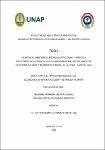Hábitos alimentarios, estado nutricional y riesgo a enfermedades crónicas no transmisibles en los estudiantes de Bromatología y Nutrición Humana de la UNAP - Iquitos, 2024

Date
2024Author
Ferreira Silva Teodoro, Neidiane
Ramos Mendoza, Danissa Geraldin
Metadata
Show full item recordAbstract
The analysis focused on identification the relationship between eating habits and nutritional status and the risk of chronic non-communicable diseases in students of Bromatology and Human Nutrition at UNAP- Iquitos, 2024. Method: Through a study that employs a quantitative, non-experimental approach, a descriptive correlational design of a cross-sectional type was implemented. The sample included 135 students from the professional school of Bromatology and Human Nutrition of the 2nd and 3rd level of study. The statistical analysis was conducted using SPSS version 25, applying the Spearman evaluation test to determine if there is a relationship between the variables. Results: 65.19% of the students had unhealthy eating habits, 31% were overweight (overweight and obesity), and high levels of blood pressure and triglycerides. These findings represent risk factors for the development of non-communicable chronic diseases. Conclusion: A direct relationship was observed between eating habits and nutritional status, as well as the risk of developing non-communicable chronic diseases. El análisis se centró en identificar la relación entre los hábitos alimentación con la condición nutricional y el peligro a padecer enfermedades crónicas no transmisibles en los alumnos de Bromatología y Nutrición Humana de la UNAP- Iquitos, 2024. Método: Mediante un estudio con una perspectiva cuantitativa, de carácter no experimental, se implementó un diseño descriptivo correlacional y transversal. La muestra incluyó a 135 estudiantes de la Escuela Profesional de Bromatología y Nutrición Humana del 2do y 3er nivel de estudio. El análisis estadístico se realizó utilizando SPSS versión 25, aplicando la prueba de evaluación de Spearman para determinar si existe una relación entre las variables. Resultados: el 65.19% de los estudiantes presentó hábitos alimentarios no saludables, 31% presentó exceso de peso (sobrepeso y obesidad), así mismo, se presentó niveles elevados de presión arterial y triglicéridos. Estos hallazgos representan factores de riesgo para el desarrollo de enfermedades crónicas no transmisibles. Conclusión: Se observó una relación directa entre los hábitos alimenticios y el estado nutricional, así como el riesgo de desarrollar enfermedades crónicas no transmisibles.
Collections
- Tesis [189]

